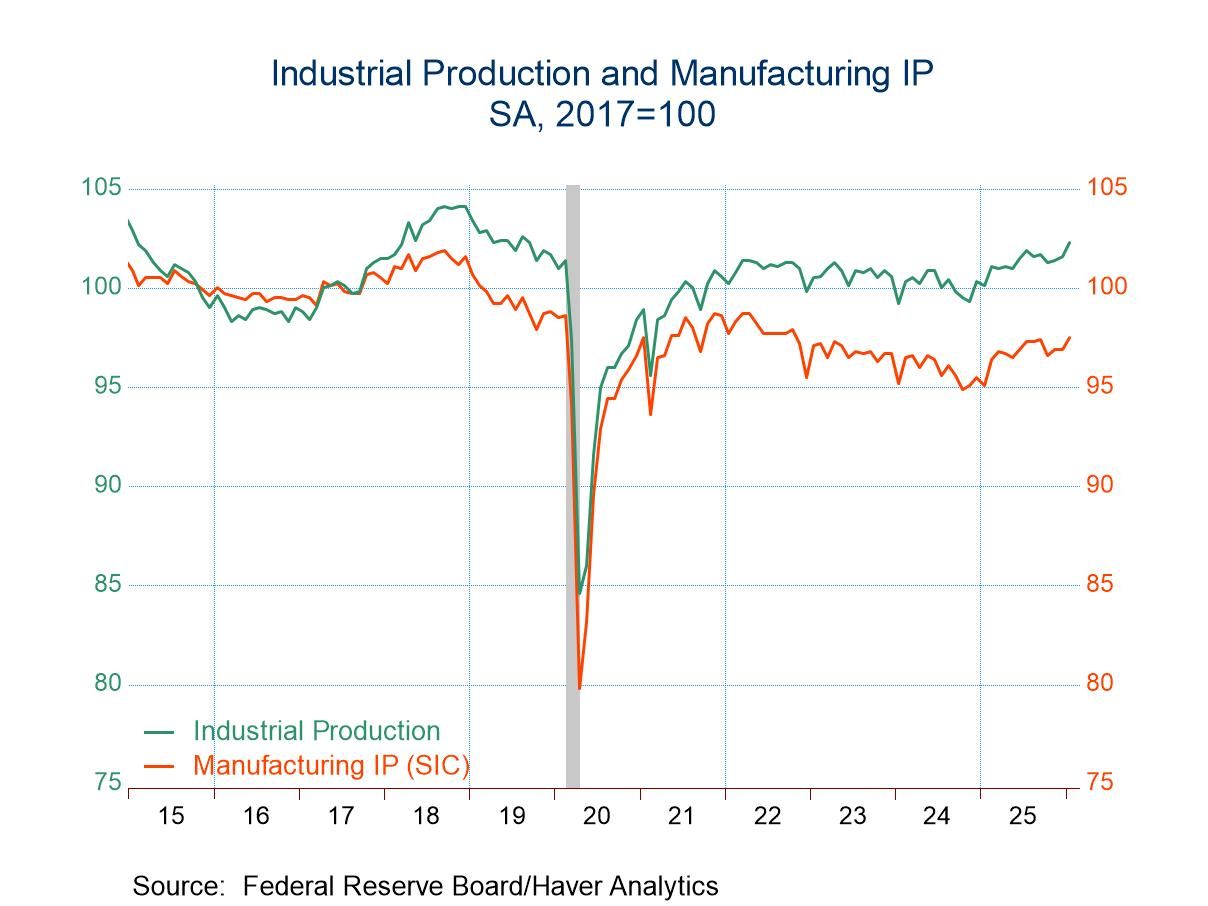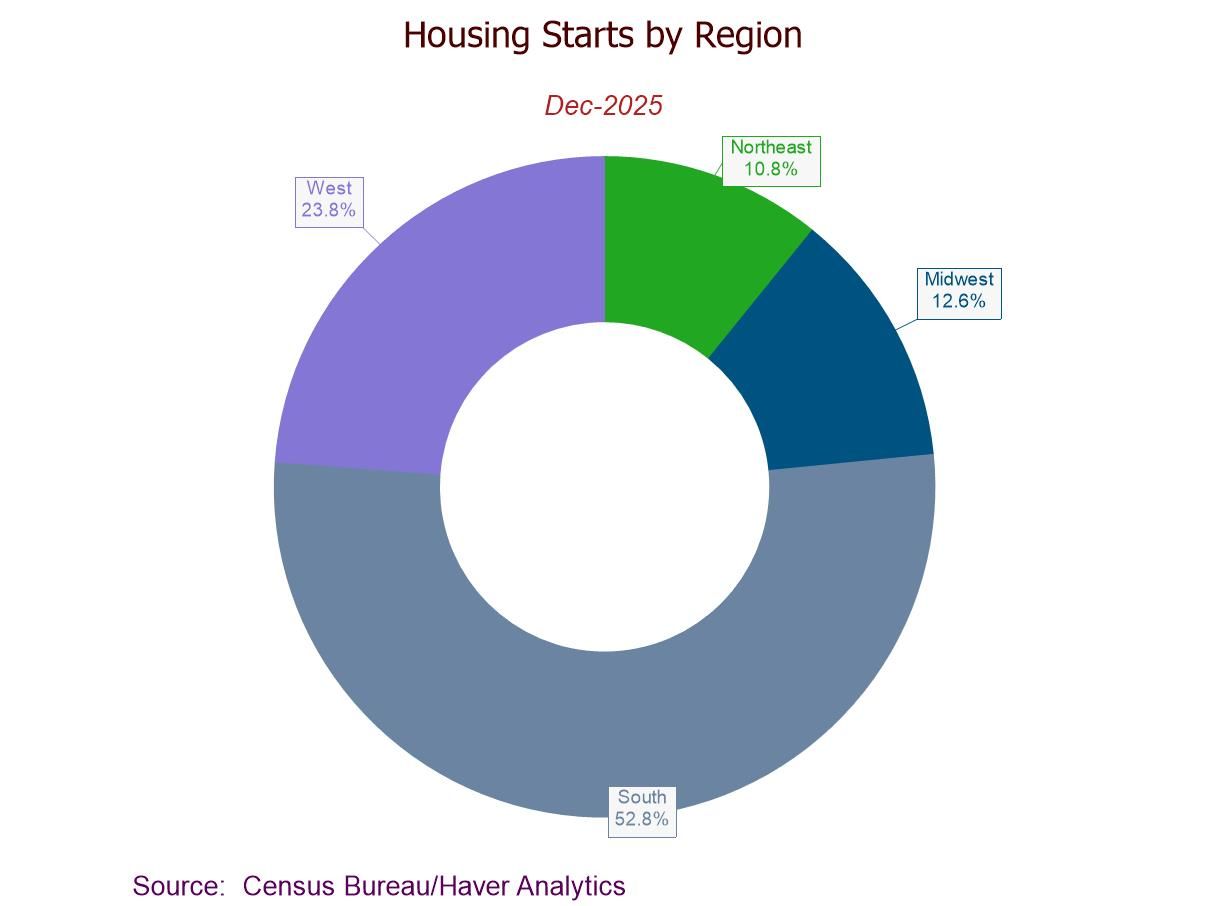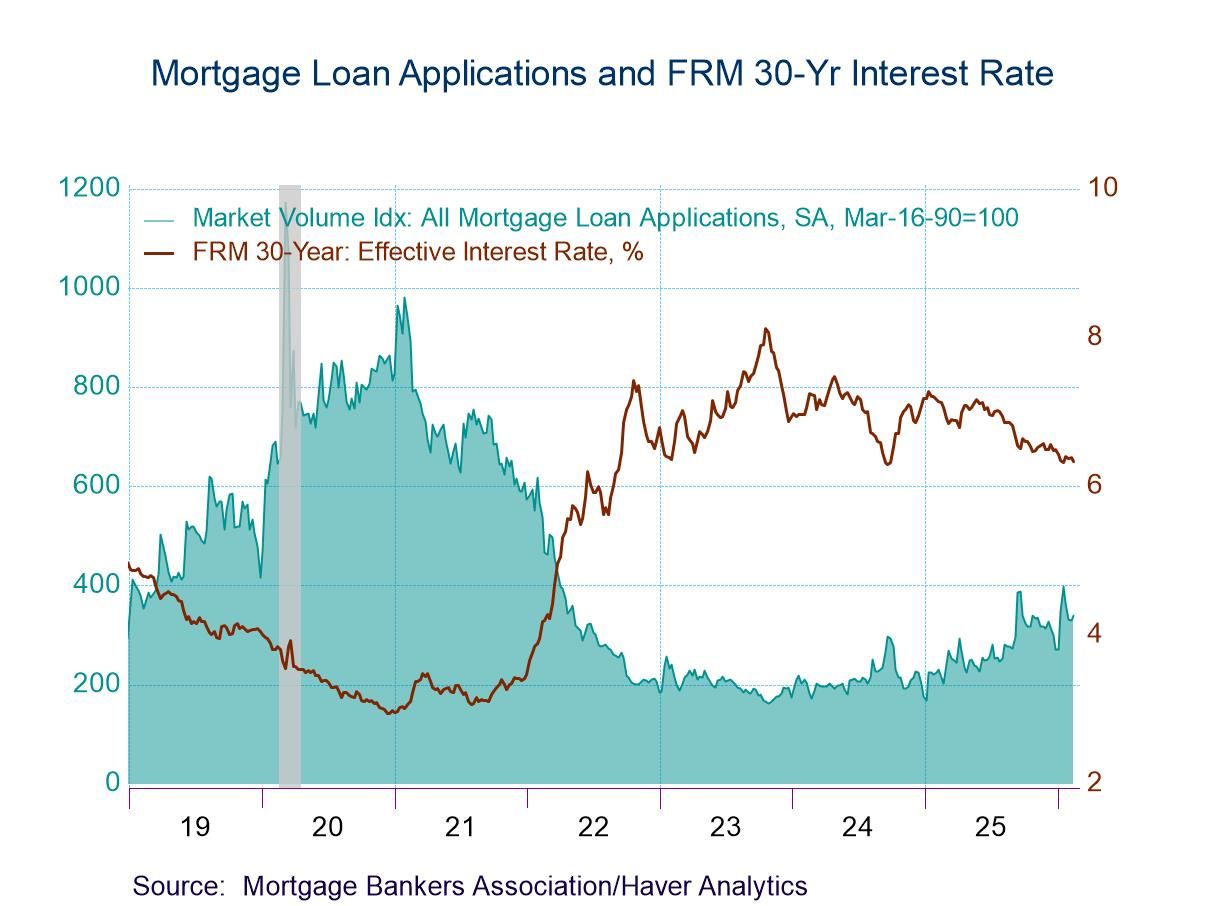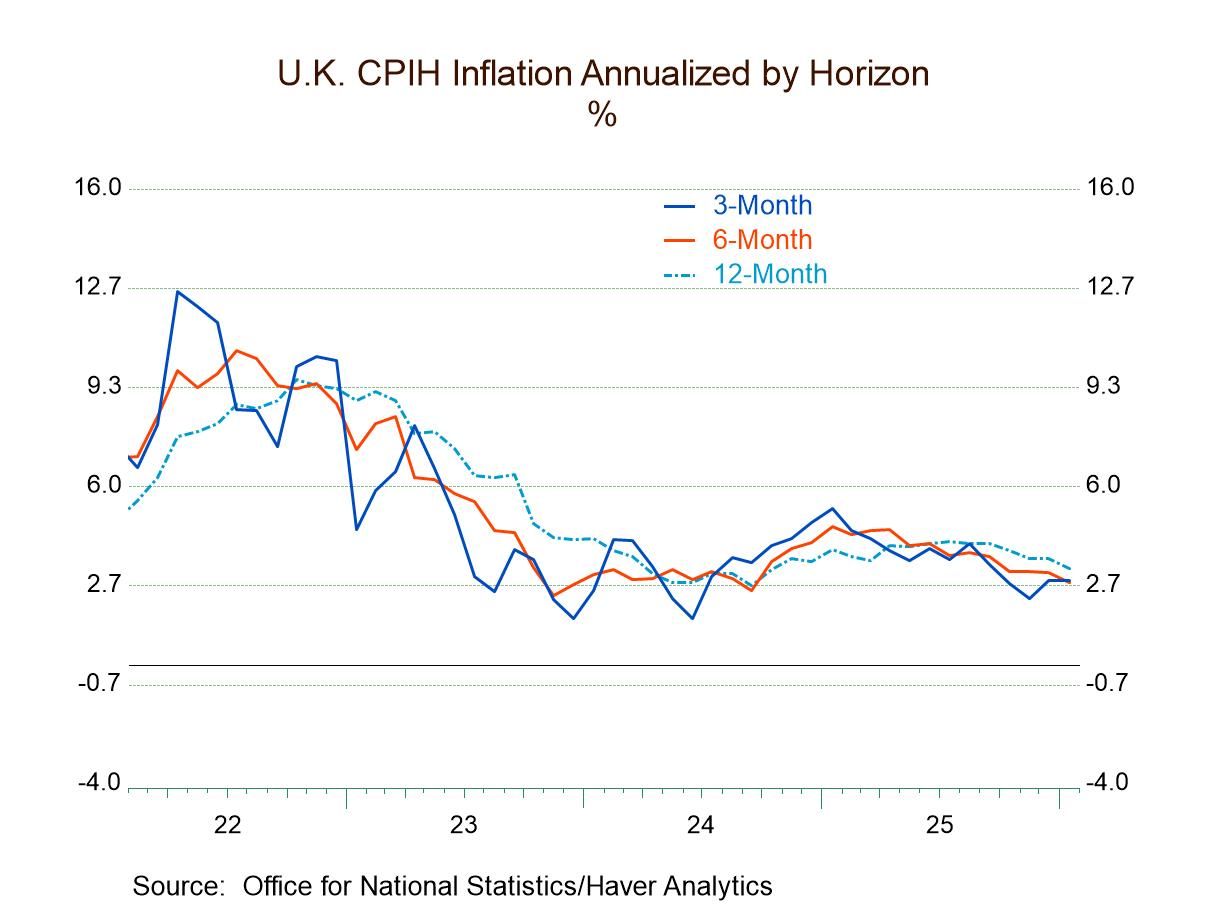 Global| Jan 31 2011
Global| Jan 31 2011German Retail Sales Fail Either To Lead Or To Follow
Summary
Kaput is what kaput does - German retail sales are off by 0.3% in nominal terms in December and by the same proportion in real terms in December. In both real and nominal terms German retail sales are getting progressively weaker from [...]
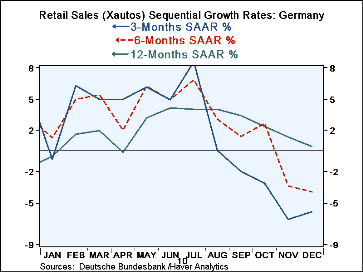 Kaput is what kaput does - German retail sales are off by 0.3% in nominal terms in December and by the
same proportion in real terms in December. In both real and nominal terms German retail sales are getting progressively
weaker from Yr/Yr growth rates to 6-mo growth rates to 3-Mo growth rates. In the quarter ended in December nominal retail
sales are declining at a 5.2% annual rate and real sales are off at a 6.6% annual rate. That's not going to support much
of any kind of growth. And this economy is Europe's locomotive? As were we wrote in an earlier piece. Loco? Yes! Motive? No!
Kaput is what kaput does - German retail sales are off by 0.3% in nominal terms in December and by the
same proportion in real terms in December. In both real and nominal terms German retail sales are getting progressively
weaker from Yr/Yr growth rates to 6-mo growth rates to 3-Mo growth rates. In the quarter ended in December nominal retail
sales are declining at a 5.2% annual rate and real sales are off at a 6.6% annual rate. That's not going to support much
of any kind of growth. And this economy is Europe's locomotive? As were we wrote in an earlier piece. Loco? Yes! Motive? No!
The German cat-bird seat - Germany has been able to sustain a strong manufacturing sector largely as it has cemented it competitiveness position within EMU by running progressively lower inflation rates than its fellow EMU nations since the EMU areas was formed. Over time this low inflation results in a greater competitive advantage to German firms. And with a firm MFG sector Germany has been able to lower its unemployment rate to some extent.
Austerity as a prophylactic - But Germany also has implemented austerity. And while it has been the backbone (of sorts) to various European bailouts, these bailouts have come with strings attached to more austere policies. This German 'intervention' also has protected German banks that have massive exposure to the countries that are now having financial troubles. The picture of a solid Germany amid a troubled Euro-Area is therefore out of kilter with reality. Had Germany not bailed out its troubled European neighbors its own banking sector would have had problems., What is so interesting to me is despite the fact that Germany was knee-deep in the exposure to this crisis, the countries to whom Germany lent seemed to flex very little leverage out of their circumstance based on Germany's own involvement and susceptibility to any resulting contagion. In the past debtors realized that they had leverage over their lenders. Indebted, developing nations seem to have played that game better than have the more industrialized countries of the Euro-Area.
Ricochet nation? - So whenever an eyebrow is raised about a troubled Euro-Area nation, it is natural for some skepticism to rebound and nag at the German economy. We cannot know what is in the back of the German consumer's mind. Does this risk haunt the German consumer and keep his own confidence suppressed? The problem does seem to be inflation which is a standard hobgoblin for German confidence. German inflation is still well in check even as euro-area inflation has picked up. German headline inflation is at 1.8% or 1.9% depending on the measure and the core rate is below 1% as EMU headline inflation is at 2.4%. Still the German economy has been heating up but with not much help from the consumer. That ultimately implies that Germany has kept its riches to itself.
Germany: a Black Hole for growth - The German consumer sector has refused to lead the recovery or even to follow it while the MFG PMI has moved up strongly. According to the EMU measures German confidence improved through July of last year then progress halted. Meanwhile, the rest of the economy continued to improve. If Germany is to be a real backbone for Europe it must help to support growth by giving back not just taking.
Export-led growth is self-serving - Exports suck domestic demand out of foreign economies and transfer the spending stimulus to the export county's firms and workers. If these firms and workers do not respond by increasing their activity and buying imports then export strength becomes a siphon to cross border demand. Germany has exported not only goods, but a philosophy of austerity and set the anchor for the Euro-Area on a slow growth path. Other countries try to pull away from Germany's chosen path at their own peril. Since financial prudence rather than life-giving growth has been the agreed on strategy endorsed by the bailout-backing German economy, everyone is forced to play follow the leader with Germany. It's a bit like being on the autobahn with only one lane open, stuck behind a Mercedes that chooses to drive at 40KMH, when you know it could do better.
Life-support not support of life - Germany is not spinning out any domestic demand to stimulate growth abroad to help those countries to which it gave financial backing and from which action it protected its own banking system. This makes German aid a cruel sort of help. It's like giving a patient in intensive care only enough' IV' drip to keep him alive but not enough for him to recover.
Growth is behind door number...? If the Germany economy with its revved up MFG sector and financial strength cannot surmount its own obsession with austerity to pull some demand out of its hat it is unclear what will be the base for EMU growth to build upon.
Down the rabbit hole after the elusive gains from austerity - We have already seen the UK post a negative Q4 GDP result. And the UK is not in the Zone and has a separate currency to allow it flexibility; but it still felt compelled to follow the continental drift of EMU into the wonderful wacky world where 'less' is 'more'. The UK followed Angela Merkel down the rabbit hole. Its own retail sales growth has slowed in Q4. With a hiked VAT on tap for January, we might have expected purchases to shift to Q4 in the UK and exaggerate retail strength. If that did happen it is bad news indeed for the coming UK Q1 retail sales report.
Curiouser and curiouser... Beyond the UK there is a clear question mark about growth that overhangs all of Europe. The EMU service sector as assessed by the EMU Commission indices which is where the jobs ultimately are created. That index for the Zone stands in the 38th percentile of its range of values from 1990-date. If there is only austerity and if the strong nations of the Zone have consumers that will not spend what they earn what will sustain growth? Certainly in an environment like that we can't expect capital spending to remain much of a stalwart, can we? No wonder the bank of Ireland halved its forecast for 2011 growth. The wonder is that it still projects a positive number at all (and it does, 1%).
No OK corral, no shoot-out, and no white hats; a 'KO' corral? - We shall continue to look for evidence of the emergence of the German Consumer. But there is little chance that he will come riding in on white horse to the rescue of beleaguered and battered Euro-Area demand. It's just not like him. No, he is more likely to come riding in and to tell the indebted widow who just won the Irish sweepstakes that she has to bring all her payments up to date and deposit the remaining funds in a German bank to secure her future. No wasting that money on needless consumption like food, clothing or education. And that is where the Zone stands today.
10
10
10
SAAR
10
10
10
Robert Brusca
AuthorMore in Author Profile »Robert A. Brusca is Chief Economist of Fact and Opinion Economics, a consulting firm he founded in Manhattan. He has been an economist on Wall Street for over 25 years. He has visited central banking and large institutional clients in over 30 countries in his career as an economist. Mr. Brusca was a Divisional Research Chief at the Federal Reserve Bank of NY (Chief of the International Financial markets Division), a Fed Watcher at Irving Trust and Chief Economist at Nikko Securities International. He is widely quoted and appears in various media. Mr. Brusca holds an MA and Ph.D. in economics from Michigan State University and a BA in Economics from the University of Michigan. His research pursues his strong interests in non aligned policy economics as well as international economics. FAO Economics’ research targets investors to assist them in making better investment decisions in stocks, bonds and in a variety of international assets. The company does not manage money and has no conflicts in giving economic advice.



